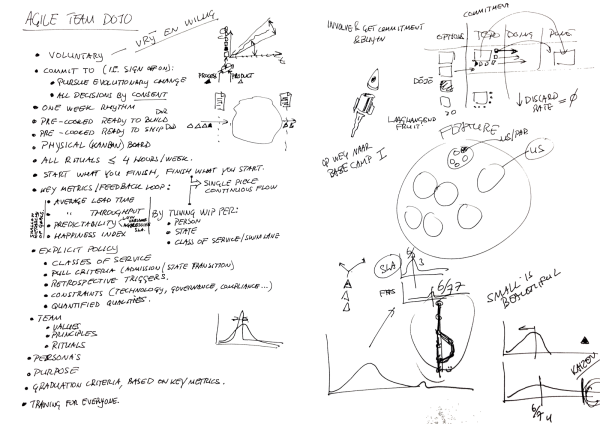Difference between revisions of "Agile team dōjō"
m (A {{p|stable team}} = {{p|product owner}} + {{p|scrum master}} + {{p|build crew}}.) |
m (+Theme:Team) |
||
| (4 intermediate revisions by the same user not shown) | |||
| Line 2: | Line 2: | ||
|goal=quickly have a team take an agile quantum leap | |goal=quickly have a team take an agile quantum leap | ||
|stage=Sparkle | |stage=Sparkle | ||
|theme=Agile, Maneuver | |theme=Agile, Maneuver, Team | ||
|context=agile teams all over the place. | |context=agile teams all over the place. | ||
|wish=An nimble, agile and hyper-performing team. | |wish=An nimble, agile and hyper-performing team. | ||
|so=Guide and coach the team through an intense weekly training program. | |so=Guide and coach the team through an intense weekly training program. | ||
|image=Agile-dojo-sketch.png{{!}}600px | |||
|wish full=A nimble, agile and hyper-performing team. | |wish full=A nimble, agile and hyper-performing team. | ||
|background=Consider to experiment with the dōjō metaphor as well as shu-ha-ri. The goal is to allow teams to, '''voluntary''', '''take a quantum leap in your agility''' in a short intense period of time (6–12 weeks). Secondary goal is to become more results-oriented as an {{p|agile coach}}, and to make sure that Agile Coaches deliver on promises in a limited time. | |background=Consider to experiment with the dōjō metaphor as well as shu-ha-ri. The goal is to allow teams to, '''voluntary''', '''take a quantum leap in your agility''' in a short intense period of time (6–12 weeks). Secondary goal is to become more results-oriented as an {{p|agile coach}}, and to make sure that Agile Coaches deliver on promises in a limited time. | ||
| Line 23: | Line 24: | ||
A {{p|stable team}} = {{p|product owner}} + {{p|scrum master}} + {{p|build crew}}. | A {{p|stable team}} = {{p|product owner}} + {{p|scrum master}} + {{p|build crew}}. | ||
|therefore full=Guide and coach the {{p|stable team}} through an intense weekly training program based on {{p|agile shock therapy}}. | |therefore full=Guide and coach the {{p|stable team}} through an intense weekly training program based on {{p|agile shock therapy}}. | ||
|new===Graduation== | |||
Your {{p|squad}} or {{p|tribe}} graduates from the {{p|agile team dōjō}} iff all of the following are true for four subsequent weeks: | |||
#Average individual {{p|happiness index}} ≥ 3. | |||
#Absolute team {{p|happiness index}} ≥ 3. | |||
#{{cfd}} healthy and published. | |||
#{{p|average lead time distribution}} graphed and trend stable or improving. | |||
#{{p|throughput}} published and trend stable or improving. | |||
#{{p|predictability}} shows a standard deviation ≤ {{TBS}}. | |||
#All {{p|work in progress limits}} honored 100% of the time. | |||
The graduation criteria can be seen as a specific form of {{p|operations review}}. | |||
}} | }} | ||
Latest revision as of 10:10, 9 March 2014
…agile teams all over the place.
✣ ✣ ✣
A nimble, agile and hyper-performing team.
Consider to experiment with the dōjō metaphor as well as shu-ha-ri. The goal is to allow teams to, voluntary, take a quantum leap in your agility in a short intense period of time (6–12 weeks). Secondary goal is to become more results-oriented as an agile coach, and to make sure that Agile Coaches deliver on promises in a limited time.
Nota Bene: Teams volunteer for the agile team dōjō. This implies commitment from the stable team as a whole.
Entering the dōjō implies a formal admission. All team members need to sign a document (declaration of agility) where they agree to:
- pursue sustainable incremental evolutionary change;
- adopt agile shock therapy.
From Wikipedia:
- A dojo (道場 dōjō?) is a Japanese term which literally means “place of the way”. Initially, dōjōs were adjunct to temples. The term can refer to a formal training place for any of the Japanese do arts but typically it is considered the formal gathering place for students of any Japanese martial arts style such as karate, judo, or samurai, to conduct training, examinations and other related encounters.
- The concept of a dōjō as a training place specifically for martial arts is a Western concept; in Japan, any physical training facility, including professional wrestling schools, may be called dōjō because of its close martial arts roots.
In shu state, you do exactly what the agile coach says. In ha state, the stable team gradually take over from the coach. In ri state, stable team are the coach.
A stable team = product owner + scrum master + build crew.
Therefore:
Guide and coach the stable team through an intense weekly training program based on agile shock therapy.
✣ ✣ ✣
Graduation
Your squad or tribe graduates from the agile team dōjō iff all of the following are true for four subsequent weeks:
- Average individual happiness index ≥ 3.
- Absolute team happiness index ≥ 3.
- cumulative flow diagram healthy and published.
- average lead time distribution graphed and trend stable or improving.
- throughput published and trend stable or improving.
- predictability shows a standard deviation ≤ to be specified.
- All work in progress limits honored 100% of the time.
The graduation criteria can be seen as a specific form of operations review.
✣ ✣ ✣
